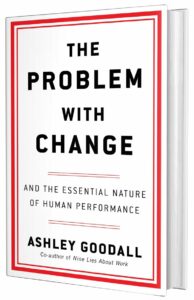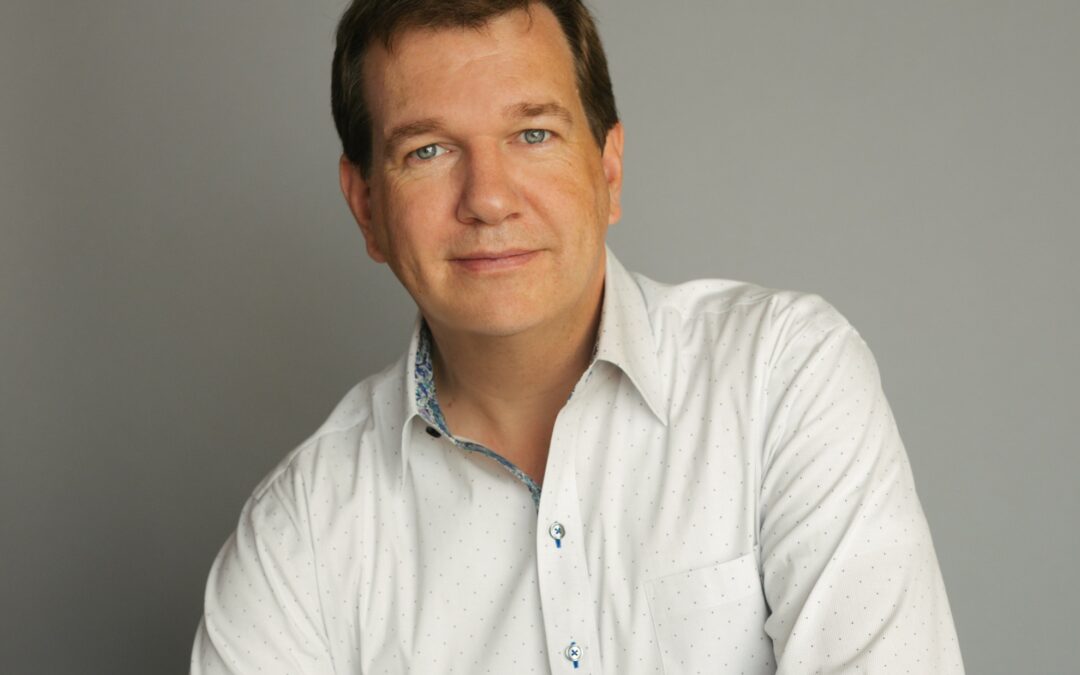Podcast: Play in new window | Download
Subscribe: Spotify | Email | RSS
 On this week’s episode of The Leadership Habit podcast, host Jenn DeWall welcomes leadership expert and author Ashley Goodall to discuss the problem with change! For decades, “disruption” and “change” have been regarded as crucial to business growth and success. In his latest book, The Problem with Change: And the Essential Nature of Human Performance, Ashley Goodall argues that what has become the accepted norm is actually quite harmful.
On this week’s episode of The Leadership Habit podcast, host Jenn DeWall welcomes leadership expert and author Ashley Goodall to discuss the problem with change! For decades, “disruption” and “change” have been regarded as crucial to business growth and success. In his latest book, The Problem with Change: And the Essential Nature of Human Performance, Ashley Goodall argues that what has become the accepted norm is actually quite harmful.
Whether it’s a merger, new software or a new office layout, change has become the central goal for many leaders, who pursue it with abandon. Goodall believes that this constant churn of change leads to what he calls “life in the blender”—a perpetual cycle of upheaval, uncertainty, and unease. Goodall believes that this is not only bad for human performance, it’s bad for business!
Meet Ashley Goodall – Author, Leadership Expert, Executive
Ashley Goodall is a leadership expert who has spent his career exploring large organizations from the inside, most recently as an executive at Cisco. He is the co-author of Nine Lies About Work, which was selected as the best management book of 2019 by Strategy + Business and as one of Amazon’s best business and leadership books of 2019. Prior to Cisco, he spent fourteen years at Deloitte as a consultant and as the Chief Learning Officer for Leadership and Professional development.
His new book, The Problem with Change, was released on May 7, 2024. In it, Goodall reveals how the ongoing turmoil of corporate life creates uncertainty, a lack of control, a sense of not belonging and a loss of meaning. He argues that the recent increases in employee activism and quiet quitting and the record-low levels of engagement at work are, in fact, symptoms of these problems with change.
Goodall draws on extensive research into human psychology and decades of experience leading HR teams to encourage leaders to look beyond wellness and corporate cheerleading and instead focus on the environment they create at work every day. He argues that humans actually need stability to perform at their best. In his book, he explores how this can be found in how we lead, how we talk, and how we value teams, our rituals, and predictability.
As Goodall says, “The ultimate job of leadership is not disruption, and it is not to create change; it is to create a platform for human contribution, to create the conditions in which people can do the best work of their lives.”
The Difference Between Change and Improvement
As the episode opens, Jenn asks Ashley how he would like to begin their discussion, and he says he would like to begin by asking one question:
“I think one really interesting way into the conversation is to say, is there a difference between change and improvement? Oh, and if, if listeners say, no, there’s no difference, then they should probably just stop listening right now because I’m about to argue there’s a big, big difference between change and improvement.
Change means different, improvement means better, and we can distinguish that. So then you go, well, where does improvement come from? Where does improvement come from in an organization?
And it’s hard to persuade yourself that if most of the people in an organization are struggling to understand what the mission is, or where they fit in, or what team they’re a part of, it’s hard to imagine that much improvement is actually gonna come from them.
Now, if our model of an organization is improvement, and that is something that’s thought up by senior leadership, and sort of cascades gloriously down through the organization. And everybody’s just waiting on a Monday morning to be told what great improvements they’ll make. Then okay, you’re in a slightly different world.
But, if you imagine that the limitation on how good a company is, is how well its people are able to do, which I think is not unreasonable. Then you finish up saying to yourself, well, the ability of the folks on the front line to do their best work every day is a ceiling on how good the company is.
And then you ask yourself, well, what might, what might get in the way of all of that? And you sort of wander into the psychological challenges that an environment of constant change and disruption visits on people.”
The Power Paradox
Later in the episode, Ashley Goodall explains that one of the problems with change is that leaders are unaware of what it is like on the front lines of their organizations on a daily basis. He explains:
“Some of the reasons for that is information really doesn’t travel up a power vacuum very happily. If you are the person who sends the email to the senior leader saying, Hey, this is actually not landing the way you imagined it would, then I think most of us would agree you can’t do that too many times before everybody thinks you’re crazy or looking for a different job.
I think it’s true that leaders certainly in organizations of any size live in a different world from their employees if you think about the amount of money that heads to the C-suite in compensation and stock grants and you think about the lifestyles that support. Whether that is sort of zooming around the world doing corporate stuff or just being in a different sort of tax bracket by a lot than anyone you know, than the more junior employees. And I think it takes a lot of empathy to reach across those sorts of gaps in sort of material circumstances.
And then, if we want to go even further, there’s some very interesting research that’s been done in terms of what happens to somebody psychologically when you put them in charge, and they become just as alarming, they become slightly more psychopathic. They become a little more evil to their fellow humans.
And this is not somebody going, oh, when we sat down to choose all the leaders, we actually chose the psychopaths. That’s not what happens. We chose good people who were good at their jobs. Anointing them as leaders turned them into people who, in the most famous experiment, helped themselves to more than their fair share of cookies on the plate and left crumbs all over the table for somebody else to clean up.
Dacher Keltner is the psychologist who did the experiment. And it’s a beautiful experiment because we can all imagine being in the conference room and there’s one cookie left on the plate, and everyone’s sitting there going, well, in human society, it would be rude to help myself to the cookie.
And while we’re all thinking that the leader grabs the cookie, has a bite, leaves crumbs everywhere because they’re the leader and they, they, their brain has been changed by a whole bunch of people saying, you are above us in some way.
So you add all of this up, and you go, well, listen, different financial world. It is very hard to tell a leader what’s going on. And that’s not a criticism of the leaders themselves; it’s just the way that information travels in organizations and the power paradox.
And all of a sudden, you’ve got a bunch of leaders who really are not very much in touch with the results of the decisions they make. And so when they turn around and go, you know what, let’s do a reorg! Looks good. Consultants, by the way, think it’s great. And I love the consultants because they tell me how great I am, and they let me eat the last cookie.
So we’ll have the consultants come in. The consultants think that although we’d centralized last year, this year, we should decentralize because we’ll be more efficient that way. And goodness, that is why we centralized in the first place. So we’ll do the decentralization, and we’ll do a reorg and it’ll be lovely and innovation and change and disruption.
And then they are confused when the people on the front lines go, would you leave it alone? I’m just trying to do my job. And it’s impossible to do it when everything is in flux the whole time.”
What Problem Are You Solving For?
Later, Jenn asks what leaders can do to overcome the Power Paradox and better understand what is happening on the front lines of their organizations. Ashley explains that the real irony of the situation is that leaders are driving change, driving disruption, but what is missing is an understanding of what problem they are actually trying to solve.
He explains that while leaders feel a sense of urgency to charge forward, the front-line employees are usually left confused about how they can help. The real problems go unexamined, but leaders start making changes just the same.
He advises getting more comfortable talking about problems throughout the organization. Leaders can ask:
- What are some of the challenges confronting us?
- Can you help us get detailed on what exactly we could do differently?
- Where are some of the root causes of all of these things?
He advises, “If you are a leader and you share a problem, you are giving permission for other people to tell you what doesn’t work from their perspective, too. And you’ll get much, much smarter organizationally about what to aim at.”
Remember the Human Element of Change
At the heart of Ashley Goodall’s message is for leaders to remember that people are already dealing with unprecedented amounts of change. He explains:
“I interviewed a bunch of people for the book, and somebody said very poignantly, when people arrive at the office, they have already survived a lot of change that day because they’re living in a world which, you know, for the last four or five year– and then arguably for many years before that– is in tumult, wherever you look.
And you know, we have a little habit at work of saying, well, if we didn’t create change, the sum total of change in our people’s lives would be zero. And somebody said to me, it doesn’t work like that. What happens at work is the 99th change that they have to live through. If we instigate a change or the hundredth change or the hundred first change but people have a lot to deal with in their lives, it’s really hard. We should probably not arbitrarily and carelessly add to the pile.”
Where to Find More From Ashley Goodall
Be sure to listen to the full episode to get more insights and advice about successful change management strategies!
Then, to find more from Ashley Goodall:
- Buy his book: The Problem With Change
- Connect on LinkedIn
Does Your Team Need Help Managing Change?
If your team struggles with constant change and disruption, Crestcom can help! Contact us today to schedule a free 2-hour leadership workshop for your whole team! Visit crestcom.com/freeworkshop to find out more!





